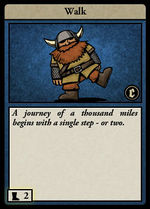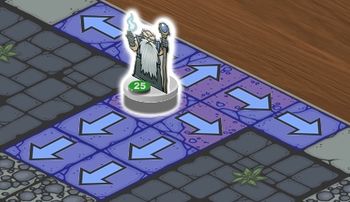Movement
| Line 4: | Line 4: | ||
{| | {| | ||
| − | | STYLE="vertical-align: center; text-align:justify;" align="left" | A move comprises two components: move points and an orientation. Move points refer to the number of [[Game Terrain#Open terrain|open terrains]] that a character can move across. For example, [[Cards/Walk|walk]] contains two move points (denoted by the little boot icon and the number 2 in the lower left corner of the card). Any character that plays [[Cards/Walk|Walk]] is allowed to move across two [[Game Terrain#Open terrain|open terrains]], assuming no obstacles are in its way. The orientation of the character at the end of its move is determined by the direction of the move. Figure 2 shows a dwarf wizard with its [[Cards/Walk|Walk]] preview. The tiles with a blue overlay show the possible moves | + | | STYLE="vertical-align: center; text-align:justify;" align="left" | A move comprises two components: move points and an orientation. Move points refer to the number of [[Game Terrain#Open terrain|open terrains]] that a character can move across. For example, [[Cards/Walk|walk]] contains two move points (denoted by the little boot icon and the number 2 in the lower left corner of the card). Any character that plays [[Cards/Walk|Walk]] is allowed to move across two [[Game Terrain#Open terrain|open terrains]], assuming no obstacles are in its way. The orientation of the character at the end of its move is determined by the direction of the move. Figure 2 shows a dwarf wizard with its [[Cards/Walk|Walk]] preview. The tiles with a blue overlay show the possible moves if the player decides to play [[Cards/Walk|Walk]]. The arrows in blue show the orientation of the dwarf wizard if he so chooses to move to the tile. If the player chooses to move the dwarf left, it will orient itself facing leftwards at the end of its move. Therefore fleeing from enemies usually exposes your character's back towards your enemy. ''Note: Movement is heavily influenced by underlying terrain. While this guide does not cover movement in relation to terrain, the reader is advised to browse the [[Game Terrain]] basic guide.'' |
| [[File:Walk.jpeg|thumb|150px|Fig. 1: The Walk move card]] | | [[File:Walk.jpeg|thumb|150px|Fig. 1: The Walk move card]] | ||
| [[File:Basic_walk.jpg|thumb|350px|Fig. 2: A dwarf wizard with walk preview]] | | [[File:Basic_walk.jpg|thumb|350px|Fig. 2: A dwarf wizard with walk preview]] | ||
| Line 11: | Line 11: | ||
==Zone of Control (ZoC)== | ==Zone of Control (ZoC)== | ||
| − | Zone of control refers to an in-game rule that forces opponents to stop when moving next to an enemy. This rule stops you from just using a single move card to whip behind an enemy. It helps tanks and other defensive characters “hold the line” and prevent enemies breaking through to your casters or healers behind. It also makes it hard for opponents to stab you in the back, where you can’t counter-attack or defend. | + | Zone of control refers to an in-game rule that forces opponents to stop when moving next to an enemy. This rule stops you from just using a single move card to whip behind an enemy. It helps tanks and other defensive characters “hold the line” and prevent enemies breaking through to your casters or healers behind. It also makes it hard for opponents to stab you in the back, where you can’t counter-attack or defend. When approaching enemies or fleeing from them, use movement previews to decide strategically the desired placement of your character against the enemy. |
Revision as of 00:02, 31 May 2013
Movements are a core element of strategic Card Hunter gameplay. In Card Hunter, you play move cards to move your characters. Without move cards in hand, even a party of hardcore warriors are reduced to nothing more than sitting ducks. This guide covers basic concepts of movement, a character's zone of control, default move cards and commonly encountered keywords associated with move cards. As moves are intricately tied with game terrains, readers are advised to browse the Game Terrain basic guide as a prelude.
Contents |
Basic Movement
| A move comprises two components: move points and an orientation. Move points refer to the number of open terrains that a character can move across. For example, walk contains two move points (denoted by the little boot icon and the number 2 in the lower left corner of the card). Any character that plays Walk is allowed to move across two open terrains, assuming no obstacles are in its way. The orientation of the character at the end of its move is determined by the direction of the move. Figure 2 shows a dwarf wizard with its Walk preview. The tiles with a blue overlay show the possible moves if the player decides to play Walk. The arrows in blue show the orientation of the dwarf wizard if he so chooses to move to the tile. If the player chooses to move the dwarf left, it will orient itself facing leftwards at the end of its move. Therefore fleeing from enemies usually exposes your character's back towards your enemy. Note: Movement is heavily influenced by underlying terrain. While this guide does not cover movement in relation to terrain, the reader is advised to browse the Game Terrain basic guide. |
Zone of Control (ZoC)
Zone of control refers to an in-game rule that forces opponents to stop when moving next to an enemy. This rule stops you from just using a single move card to whip behind an enemy. It helps tanks and other defensive characters “hold the line” and prevent enemies breaking through to your casters or healers behind. It also makes it hard for opponents to stab you in the back, where you can’t counter-attack or defend. When approaching enemies or fleeing from them, use movement previews to decide strategically the desired placement of your character against the enemy.
The Default Move Card
Coming Soon !
Common Keywords (associated with moves)
Coming Soon !

